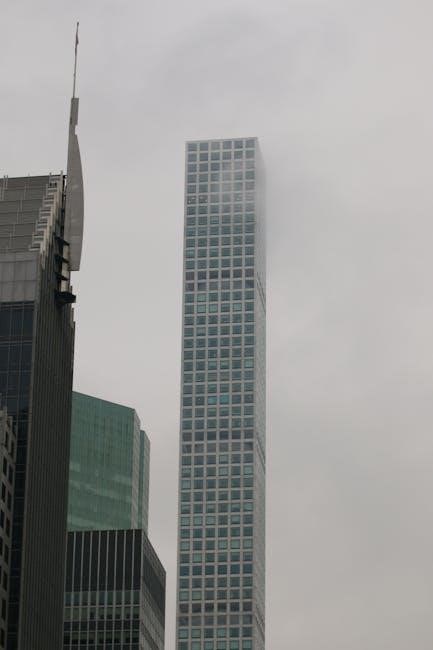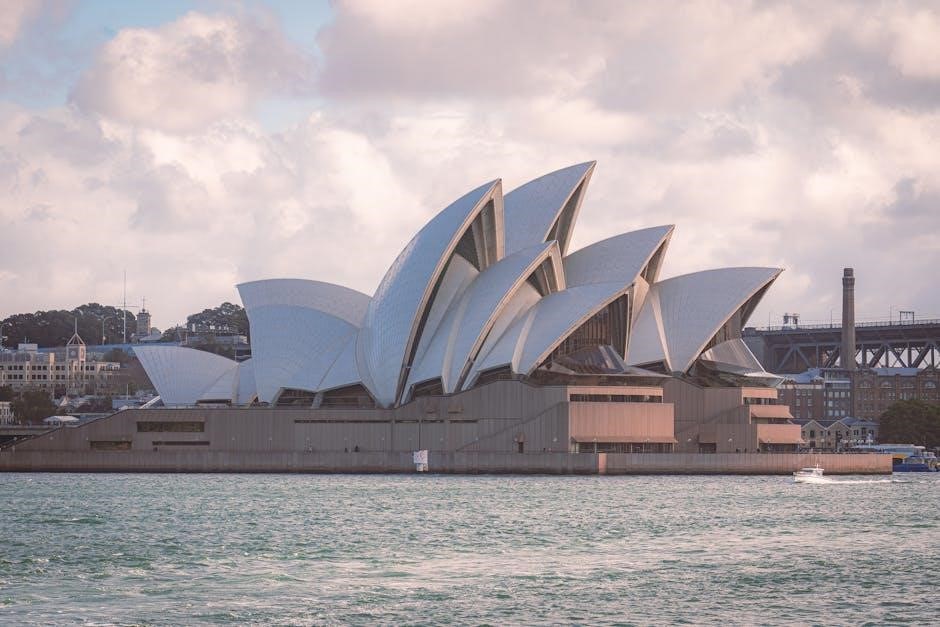
Aldous Huxley’s Brave New World, published in 1932, portrays a futuristic society where technology and control dominate. This dystopian novel explores themes of conformity, identity, and humanity’s potential fate through its hauntingly prophetic vision.

Overview of the Novel and Its Historical Context
Brave New World, written by Aldous Huxley in 1931 and published in 1932, is a dystopian novel set in a futuristic World State. It explores themes of eugenics, consumerism, and the loss of individuality in a society governed by technological advancement. The novel reflects Huxley’s concerns about the rise of totalitarianism and the dehumanizing effects of industrialization during the Great Depression. The World State’s rigid caste system, controlled by advanced genetic engineering and psychological conditioning, serves as a warning against the dangers of unchecked scientific progress and the erosion of human freedom. Its prophetic vision continues to resonate today.
The World State: A Futuristic Society
The World State in Brave New World is a highly structured, futuristic society where genetic engineering and psychological conditioning create a rigid hierarchy of Alphas to Epsilons, ensuring conformity and suppressing individuality through technologies like Soma. This dystopian vision highlights the tension between collective stability and personal freedom, offering a cautionary tale about the dangers of unchecked scientific and societal progress.
Structure and Organization of the World State
The World State in Brave New World is a rigidly stratified society divided into castes: Alphas, Betas, Gammas, Deltas, and Epsilons. Each caste is genetically engineered and conditioned to fulfill specific roles, ensuring efficiency and social harmony. The Central London Hatchery and Conditioning Centre exemplifies this structure, producing humans in a controlled environment. The World State’s motto, “Community, Identity, Stability,” reflects its emphasis on collective order over individuality. This hierarchical system is maintained through advanced technology, psychological conditioning, and surveillance, creating a society where conformity is enforced and dissent is virtually nonexistent. The structure ensures the World State’s stability but at the cost of personal freedom and creativity.
Technology in Brave New World is the cornerstone of societal control, enabling the World State to maintain power through advanced methods. Genetic engineering and artificial reproduction in hatcheries produce humans tailored for specific roles. Sleep-learning and psychological conditioning further ensure compliance with societal norms. The drug Soma serves as a technological tool for pacification, suppressing dissent and maintaining social order. These innovations, while fostering efficiency and stability, dehumanize individuals, reducing them to mere cogs in a machine. Huxley highlights how technology can manipulate and control, warning against its unchecked advancement and the potential loss of individuality and freedom. The World State’s reliance on technology underscores its dystopian nature, where progress sacrifices humanity. Brave New World explores dystopian societies, individuality, and conformity, highlighting the tension between technological progress and human values, with Soma symbolizing control and societal manipulation. Huxley’s Brave New World vividly portrays a dystopian society where individuality is erased, and citizens are genetically engineered and conditioned for conformity. The World State’s rigid caste system, controlled by advanced technology and psychological manipulation, highlights the dangers of unchecked scientific progress and authoritarian control. The pervasive use of Soma, a pleasure-inducing drug, further illustrates how societal control is maintained through distraction and pacification. These elements underscore the loss of human freedom and morality, serving as a cautionary tale about the potential darker side of technological advancement and the devaluation of individuality in a hyper-conformist society. The World State’s motto, “Community, Identity, Stability,” reflects its core values, prioritizing collective harmony over individuality. Citizens are conditioned to embrace their roles within a rigid caste system, ensuring societal cohesion. Identity is predefined by one’s caste, eliminating personal autonomy. Stability is maintained through psychological conditioning and Soma, which suppress dissent and enforce conformity. This system highlights the tension between societal order and personal freedom, critiquing the notion of a “perfect” society that sacrifices human uniqueness for the sake of control. Huxley’s exploration of these ideals underscores the dangers of a world where conformity is the ultimate goal. Soma, a highly potent hallucinogenic drug, serves as a crucial tool for social control in the World State. Distributed freely, it induces euphoria and escapism, quelling dissent and promoting conformity. Citizens rely on Soma to escape the monotony of their genetically predetermined roles, ensuring emotional stability and passive acceptance of society. The drug’s effectiveness lies in its ability to suppress individuality and critical thought, fostering a complacent population. By encouraging hedonism and distraction, Soma maintains the World State’s control, reinforcing its values of consumption and conformity. This pervasive use of Soma underscores Huxley’s critique of a society that prioritizes pleasure over freedom and autonomy. Bernard Marx, Lenina Crowne, and John the Savage are central figures. Bernard, an outsider, questions the World State, while Lenina embodies conformity. John represents humanity’s lost depth. Bernard Marx, an Alpha-Plus intellectual, feels alienated in the World State due to his unconventional thoughts. His dissatisfaction stems from the society’s emphasis on conformity and superficial happiness. Unlike his peers, Bernard yearns for genuine emotions and depth, often criticizing the moral emptiness around him. His role as an outsider allows him to observe and critique the World State’s flaws, making him a key character in exploring themes of individuality and dissent. Bernard’s perspective highlights the tension between societal expectations and personal freedom, underscoring his internal conflict and ultimate disillusionment with the system. Lenina Crowne embodies the ideals of the World State, embracing its values of conformity and superficial happiness. She is a loyal consumer and a diligent worker, accepting the society’s norms without question. Lenina’s reliance on Soma to maintain her contentment highlights her adherence to the system’s tools for control. Her strict conformity is evident in her discomfort with Bernard Marx’s unconventional ideas, showcasing her unwavering commitment to the World State’s principles. Lenina’s character serves as a stark contrast to Bernard’s dissent, illustrating the societal pressure to prioritize stability over individuality. John, the Savage, represents a stark contrast to the conditioned society of the World State. Brought from a reservation, he embodies raw emotions, individuality, and a deep connection to humanity. His exposure to the World State reveals the emptiness of its “utopia,” as he grapples with concepts like love, freedom, and identity. John’s tragic struggle to reconcile his natural humanity with the artificial society underscores the novel’s critique of a world that sacrifices authenticity for stability. His story serves as a poignant reminder of the importance of emotional depth and genuine human connection in a highly controlled environment. The Central London Hatchery and Conditioning Centre genetically engineers humans, erasing emotions and individuality. Babies are conditioned to fit society, ensuring conformity and stability from birth. In the World State, genetic engineering is used to mass-produce humans in bottles, eliminating individuality. The Bokanovsky process creates identical twins, ensuring conformity. Embryos are preconditioned into castes (Alphas to Epsilons), each designed for specific roles. This process, combined with chemical treatments, ensures societal stability by producing predictable, specialized citizens. The Hatchery and Conditioning Centre exemplifies this, where humans are manufactured rather than born, erasing natural family bonds and emotions. This system enforces a strict social hierarchy, maintaining the World State’s control and efficiency, as highlighted in Huxley’s depiction of a society where humans are engineered for utility, not humanity. In the World State, psychological conditioning begins at birth, shaping minds to conform. Hypnopaedia, or sleep-learning, implants societal values and obedience, ensuring citizens embrace their roles. Emotional conditioning, such as exposing children to “Violence” and “Blood” games, eradicates empathy and fear. The regime discourages critical thinking, promoting consumption of Soma to suppress dissent. This conditioning ensures stability, as people accept their predetermined roles without question. Huxley highlights how psychological manipulation, combined with genetic engineering, creates a compliant population, stripping individuals of free will and authentic emotions, resulting in a society devoid of true humanity and creativity. Huxley’s depiction of a society controlled by technology and consumerism eerily mirrors modern issues like social media manipulation, surveillance, and the pursuit of instant gratification. Aldous Huxley’s Brave New World resonates with modern society through its depiction of a tech-dominated, consumption-driven culture. The novel’s themes of surveillance, conformity, and the erosion of individuality mirror contemporary concerns about data privacy, social media manipulation, and the homogenization of identities. Huxley’s exploration of a society distracted by instant gratification parallels today’s obsession with fast fashion, disposable technology, and the constant pursuit of pleasure. The novel’s critique of a world where people are conditioned to value stability over freedom echoes debates about algorithmic control and the loss of autonomy in the digital age; Aldous Huxley’s Brave New World eerily predicts modern societal trends, such as the rise of advanced biotechnology and pervasive surveillance. His depiction of a society reliant on Soma mirrors today’s opioid crisis and dependence on pharmaceuticals. Huxley foresaw the commodification of human life through genetic engineering, echoing contemporary debates on cloning and bioethics. The novel’s emphasis on consumerism and instant gratification aligns with modern culture’s obsession with fast fashion and digital distractions. Huxley’s vision of a controlled, hierarchical society resonates with concerns about AI, data privacy, and the erosion of individual freedom, making Brave New World a timeless warning about humanity’s potential trajectory. Aldous Huxley’s Brave New World remains a prophetic critique of technological advancement and social control, warning against the loss of individuality and freedom in a hyper-consumerist society. Aldous Huxley’s Brave New World stands as a landmark in dystopian literature, influencing countless works exploring totalitarianism and technological control. Its eerie predictions and philosophical depth have cemented its status as a classic, resonating with readers long after its publication. The novel’s critique of conformity and consumerism continues to provoke thought, making it a timeless warning against societal manipulation. Huxley’s vision of a controlled, “utopian” society remains a powerful cautionary tale, shaping the genre and inspiring authors to reflect on humanity’s relationship with progress and freedom. Its legacy endures as a profound commentary on modernity’s darker possibilities. Brave New World serves as a stark warning about the dangers of unchecked technological advancement and the erosion of individuality. Huxley’s vision of a society controlled by pleasure, conformity, and consumption remains hauntingly relevant. The novel underscores the importance of preserving humanity’s capacity for love, art, and critical thought in the face of a hyper-controlled world. Its message is a timeless call to resist the dehumanizing forces of modernity, urging readers to reflect on the true cost of “progress” and the value of authenticity in a world that often prioritizes stability over freedom.The Role of Technology in Shaping Society
Key Themes in “Brave New World”
Dystopian Elements and Their Implications
The Concept of “Community, Identity, Stability”
The Use of Soma as a Tool for Social Control

Major Characters and Their Roles
Bernard Marx: The Outsider’s Perspective
Lenina Crowne: Representing Conformity

John the Savage: A Symbol of Humanity

The Hatchery and Conditioning Process
Genetic Engineering and Human Production
Psychological Conditioning Techniques

Brave New World and Modern Society


Parallels Between the Novel and Contemporary Issues
Huxley’s Predictions and Their Relevance Today
Legacy of “Brave New World” in Literature
Final Thoughts on the Novel’s Message
